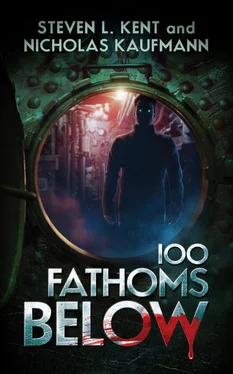“Spicer, I want your eyes and ears on the Victor , ” the captain told him.
“Aye-aye, sir,” Tim said, bolting for the sonar shack.
He took a seat in front of his console and slipped the headphones on. The vampires had broken the lights in here too, but there was still plenty of illumination coming off the display screens, which apparently hadn’t bothered their eyes as much as the overheads. It was Aukerman who had first spotted the Victor . Seated at the next console over, the engineer turned emergency sonar tech pointed out the anomalies in the cascading waterfall display, although Tim had already spotted them as soon as he sat down.
There was surface traffic as well. Two ships floated 500 feet above them, to their north and east. Tim concentrated on the noises they made, identifying one of them as a destroyer, probably Kashin class, a guided-missile ship built in the 1960s. He pegged the other ship as even older: a Sverdlov-class cruiser, a gunboat from the 1950s. That was a stroke of luck. The Soviets could just as easily have had planes patrolling the skies and dropping sonobuoys that could pinpoint Roanoke ’s location in seconds. They could have had ships dropping acoustic gear that actively pinged every cubic inch of ocean around them. Instead, the Soviets had sent two antiques to patrol these waters. Their outmoded technology was probably the only thing that had saved Roanoke from being spotted already—spotted and torpedoed. The ships were ancient by technological standards, but that didn’t make their weaponry any less lethal.
Still, as long as Roanoke stayed below the thermocline, he was confident the surface ships wouldn’t see them. The submarine on their tail was another matter. The Victor didn’t look as if she had spotted them yet. She wasn’t running on quiet, just patrolling as normal, but that could change in a matter of seconds.
Captain Weber came to the door of the sonar shack, silhouetted in the red light from the control room. He wore a somber, tense expression. “We’ve drifted right into Victor fucking Central, Spicer, and the timing could not be worse. Has she detected us yet?”
“There’s no indication she has, sir,” Tim said.
“Excellent. Keep an eye on her. If that submarine increases her speed so much as half a knot, I want to know about it.”
* * *
With only twenty-three men left aboard, the submarine was eerily quiet. Twenty-three living men, Jerry reminded himself. There were a whole lot more corpses being stored in the wardroom and the empty staterooms until they could be dealt with properly.
The berthing area wasn’t far from the mess, which normally would be so filled with boisterous conversation and sailors horsing around that Jerry wouldn’t expect to get a moment’s peace. Instead, it was deadly silent, which, he discovered, was worse. He strained his ears to hear anything, even the sound of Guidry in the galley, making cold sandwiches for the remaining crew, but there was nothing. Even the culinary specialist had probably been put to use somewhere. He got the feeling the whole middle level was empty except for him.
And then he heard them—footsteps in the corridor outside. They stopped right outside the berthing area.
“Back already, Spicer?” Jerry called. “I didn’t think the Soviets would give up that fast.”
In the murky red light, he saw something small appear at the side of the curtain. From a distance, it took him a moment to recognize fingers grasping the doorframe. A shape pushed through the curtain without bothering to move it aside. The red light fell across the man’s face, illuminating his features. Jerry stiffened.
Warren Stubic, the torpedoman who had frozen to death in Lieutenant Abrams’ freezer, walked into the berthing area.
* * *
Tim studied his sonar screen. Roanoke was a small target in a vast ocean, and a moving target at that. As long as they remained at ultraquiet, barely making a sound as they drifted out of the Victor’s sonar range, the Soviets didn’t have a prayer of finding them with their outdated equipment.
Still, the worst thing a sonar tech could do was get cocky, because that led to sloppiness, which led to mistakes. Tim forced himself to focus. His mind was still moving in a thousand different directions, trying to process everything that had happened—the horrible deaths, the sudden revelation that vampires were real—but he pushed himself to concentrate on the Soviet submarine instead. He couldn’t let anything distract him or they could wind up dead on the bottom of the ocean. He sure as hell hadn’t survived a horde of hungry vampires just to become fish food.
So he watched the screen and listened to the sounds the Victor made—and it didn’t sound right. She was traveling at nine or ten knots, not trying to be stealthy, her engine banging and clanging. But something was missing, something important that he couldn’t put his finger on. He had memorized all the common sound signatures that Soviet boats made—it came with being an experienced sonar tech. But this sounded so unusual, so off, that he reached for the console and hit a few buttons to record it. It was standard operating procedure. When sonar techs heard something they didn’t recognize, they recorded the sound and compared it to other audio recordings later, to identify it.
But as he listened, it came to him what was missing from the Victor’s sound, and he sat bolt upright in his seat.
As far as he knew, the US Navy was the only submarine service with quiet boats. Soviet subs ran loud. No other militarized nation with a navy even had nuclear-powered subs. They still had diesels, loud as trucks underwater. American subs ran quieter than the rest of them because their screws were specially designed and shaped to reduce cavitation—the formation of air bubbles—and therefore remain quiet enough not to be detected by sonar.
The Victor’s screw wasn’t causing cavitation. Tim could hear her engines, but her propeller was as silent as their own.
And that just wasn’t possible.
* * *
Too late, Jerry realized that they had been wrong. Jefferson wasn’t the last of the monsters. All this time, in the quarantined isolation of the torpedo room, in the same dark space where the vampires had hidden themselves before launching their attack, PO3 Warren Stubic had lain frozen in his body bag. But the cold hadn’t killed him, because cold didn’t kill vampires. It had only left him dormant, hibernating while he slowly thawed. Now he was back, the one who had brought this curse onto Roanoke in the first place, patient zero of the vampire outbreak. And Jerry was alone with him in the berthing area. Alone and incapacitated.
But something was wrong with Stubic’s eyes. No inhuman glow came from within them, and they didn’t appear to be focused on anything, not even on Jerry. Being frozen solid had damaged his eyes somehow. Stubic was blind.
Jerry’s rack was at the back of the berthing area, built into the farthest bulkhead from the doorway, but he couldn’t stay there. Confined to such a tight space, he was a sitting duck. He tried to slide out of his rack as quietly as he could, but the injured knee was too sore and too stiff for him to move silently. He squirmed his way to the edge of the rack, then dropped to the floor. He stifled a cry as his broken nose, fractured eye socket, and broken knee all felt the impact. But it didn’t matter—Stubic heard him anyway. The vampire’s head snapped in his direction, and the lips pulled back in a rictus grin to reveal long viperine fangs.
The berthing area was wide enough for two rows of freestanding bunks between the rows built into the bulkheads. If he could keep the bunks between himself and Stubic, he might be able to make it out. Jerry grabbed the corner of the nearest bunk in the middle and pulled, dragging himself along the floor.
Читать дальше












